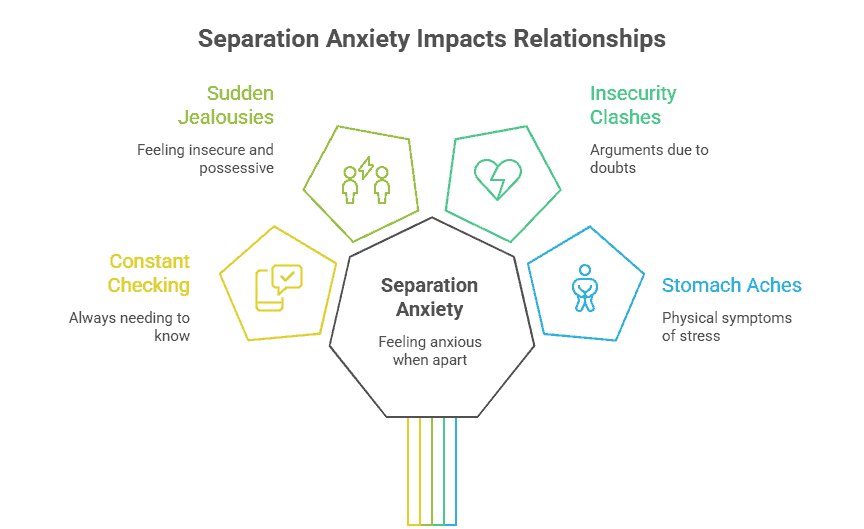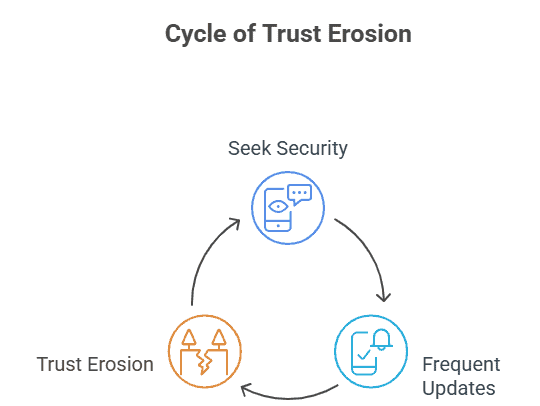In many cultures, some have argued that what happens during the very first day in school is the essence of separation anxiety! Separation anxiety from relationships is sneaky indeed! Constant checking-in, sudden jealousies, insecurity clashes, or worse, stomach aches along with every step taken away from each other can all be signs of separation anxiety in relationship. Recognizing such patterns is the first step in forming healthy and secure relationships.

What Separation Anxiety Looks Like in Adult Relationships
Missing your partner is an ordinary human thing! Wanting to call and share about one’s day or wanting to hear the voice of the partner over the telephone before going to sleep? That is indeed love. But those feelings of longing can quickly metamorphose into a painful state that entirely disrupts a person’s working life; maybe there lies separation anxiety! Unlike plain love, this variety of anxiety becomes a constant sensation of dread, of beyond emotional intensity, and it sparks behaviors that may seem too much for both partners to consider.
Behavioral & Emotional Signs (What Partners Notice First)
Excessive Need for Contact
Does your phone buzz every five minutes with a “Just checking in”? While some communication is healthy, constant calls, texts, or video messages may signal more than just affection. It often reflects deep worry about being apart.
Fear of Abandonment
A partner may feel convinced you’ll leave—even when there’s no evidence of this happening. Reassurance helps briefly, but the fear often resurfaces quickly, leaving both people drained.
Intrusive Thoughts and “What-Ifs”
Instead of focusing on daily tasks, someone with separation anxiety might be caught in a loop of “What if they’re hurt?” or “What if they stop loving me?” These obsessive thoughts can feel all-consuming.
Jealousy and Possessiveness
Normal jealousy does come and go, but separation anxiety can bring its own kind of fiery intensity to it. Your partner might question innocent interactions or feel uneasy when you spend time with friends or coworkers.
Emotional Outbursts
Tears, agitation, or even anger can erupt when separation occurs, whether it’s you staying late at work or planning a night out. These reactions often stem from fear, not malice.
Difficulty with Alone Time
Some people with separation anxiety struggle to be by themselves, preferring constant company. Canceling plans, avoiding solo errands, or refusing to spend evenings alone may be part of the pattern.
Reassurance-Seeking
Endless questions like “Do you really love me?” or “You won’t leave me, right?” may pop up repeatedly. While reassurance helps in the moment, it rarely eases the underlying anxiety.
Physical Signs (When Worry Hits the Body)
Stress-Linked Symptoms
Headaches, nausea, or an unsettled stomach may appear during separations—or even in anticipation of them. Anxiety doesn’t just stay in the mind; it often shows up physically.
Sleep Disturbances
Recurring nightmares about losing a partner, tossing and turning, or waking up anxious are common. Nights apart may feel especially challenging.
Panic-Like Sensations
Shaking hands, racing heartbeat, or sweating can emerge during stressful separations. For some, it feels close to a panic attack.
Relationship-Level Signs (Impact on the “Us”)

Trust Erosion
Checking phones, scrolling through social media, or asking for constant updates may seem like ways to feel safe—but they chip away at trust over time.
Controlling Patterns
One partner may set rules around where the other can go, who they can meet, or how quickly they should respond. These controlling behaviors often come from fear, but they can suffocate the relationship.
Shrinking Social Circles
Over time, both partners might stop engaging in outside friendships, hobbies, or work events. What begins as closeness can turn into isolation.
Conflict Cycles
Pursue–withdraw dynamics often emerge: one partner demands closeness, while the other retreats to find breathing room. The cycle leaves both feeling misunderstood.
Functional Signs and Why They Appear
Apart from messing up with emotions, sometimes it can significantly disrupt day-to-day living. Some individuals may find themselves avoiding embarking on a trip, going to work, or even running the smallest errands because separation is so painful to them. Others may be entering in complete compliance with just give up on social activities or interests for the sake of peace, which might backfire in the end into full-blown resentment. The short-term distractions, whether it be overeating, drinking, or incessantly chatting about anything and everything, only end up doing much more harm than good.
Typically, these patterns fail to arise spontaneously. Previous phases of betrayal, loss, or infidelity would have augmented the dread of being abandoned yet again. Life changes such as moving out, entering a brand-new working environment, or sometimes even grieving aggravate those fears. Sometimes the separation anxiety hinges on co-dependency, where one partner’s identity melds so very closely with that of the other that even a short separation is almost unbearable.
How to Talk About It Without Making Things Worse
When talking about separation anxiety, people must be patient and ensure they’re relaxing at the right moment. “I” statements could enhance acceptance if any guilty feelings seem to rise to the occasion: “I feel worried when I don’t hear from you” rather than, “You never answer me.” Small but practical goals will reduce tension: for example, agreeing to two check-ins during work hours instead of constant messaging. Consistency in telling-to-do will forge trust more than verbal assurances.
If the troubles began to disrupt daily life or maybe began to affect the relationship, then the opportunity for change presents itself whenever help is sought. Therapy can target anxious attachment patterns, foster adjustment skills, including self-soothing and working toward gradually increased time spent apart, and coach couples in maintaining healthy independence. Couples counseling offers a neutral and safe space in which to change feelings of conflict into times of affiliation.
What This Means for You
Working relationships generally thrive on a fine balance between closeness and flow. Observe signs of separation anxiety in relationship, and that’s not a sign of doom for the bond but an opportunity to work toward more trust, esteem, and communication: with patience and support, couples may work through anxious patterns into secure attachment.
Next Steps: How Couples Counseling Illinois Can Help
We help couples caught in anxious cycles return to balance-i.e., in couples counseling in Illinois. Our therapists create a safe space in which both partners are heard, understood, and moved towards healthier behaviors. The goal is to strengthen the bond that originally brought you together: trusting each other, communicating better, or simply doing their own thing without worry.
Because love shouldn’t feel like a constant alarm—it should feel like home.





